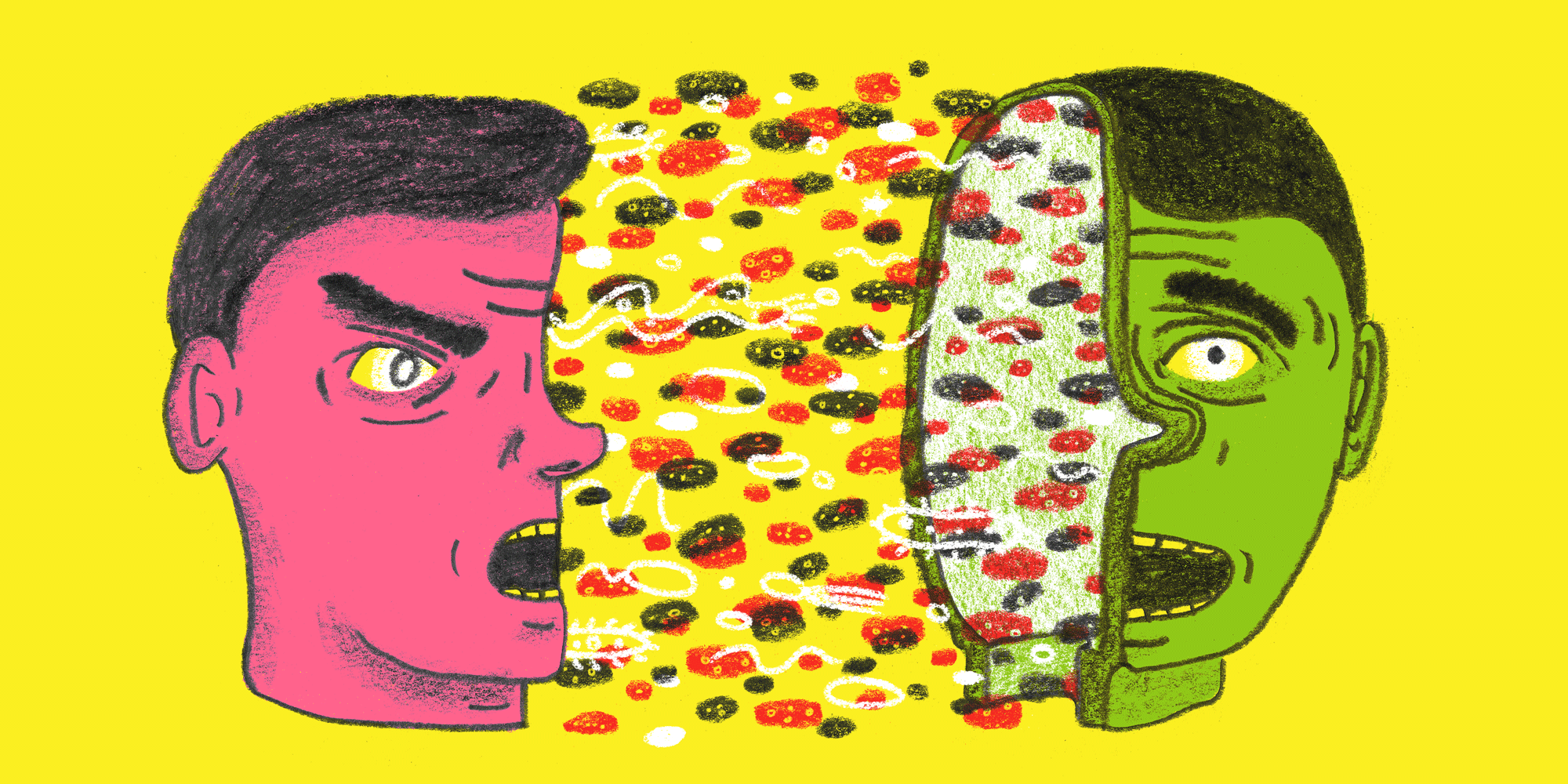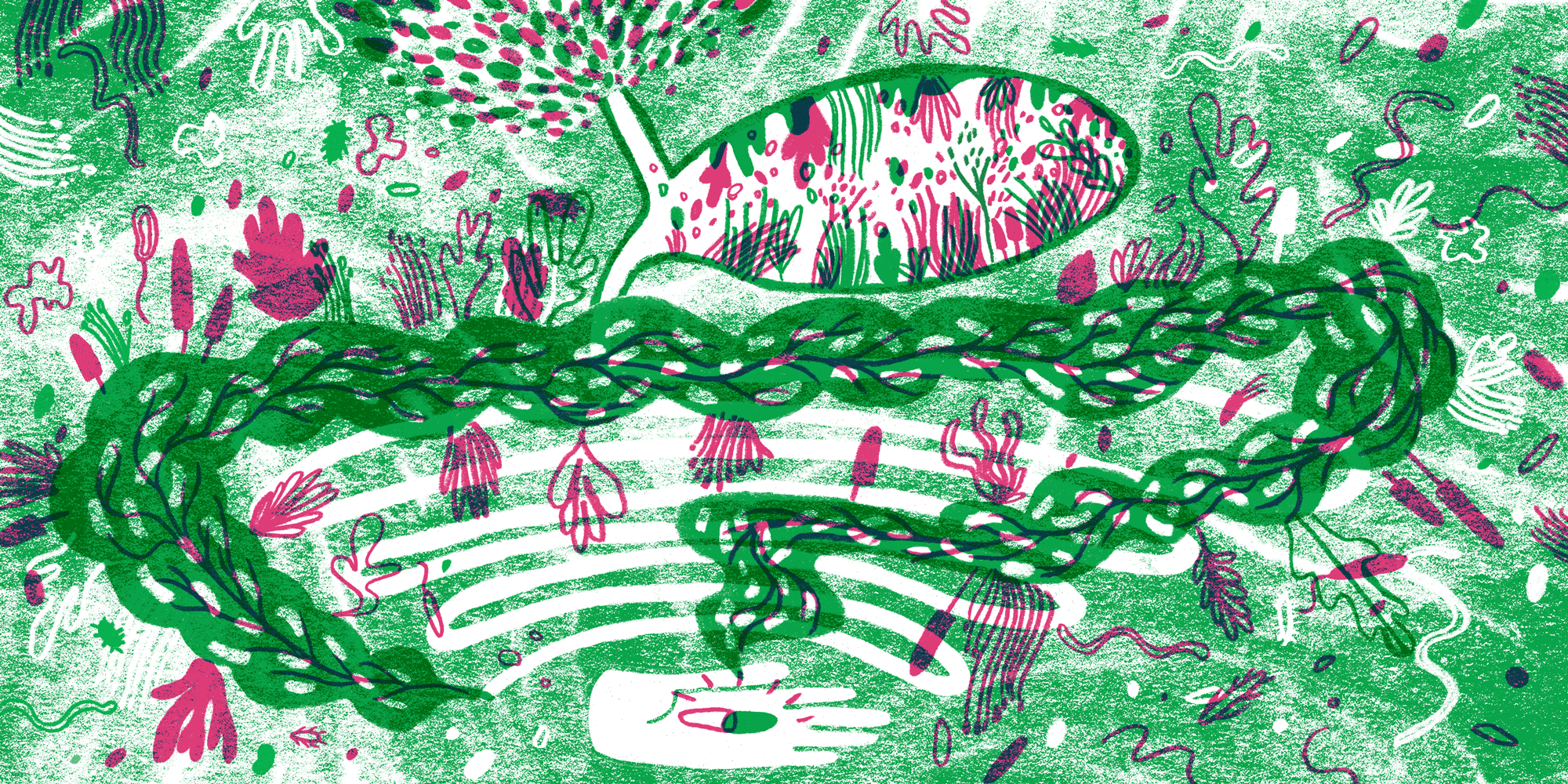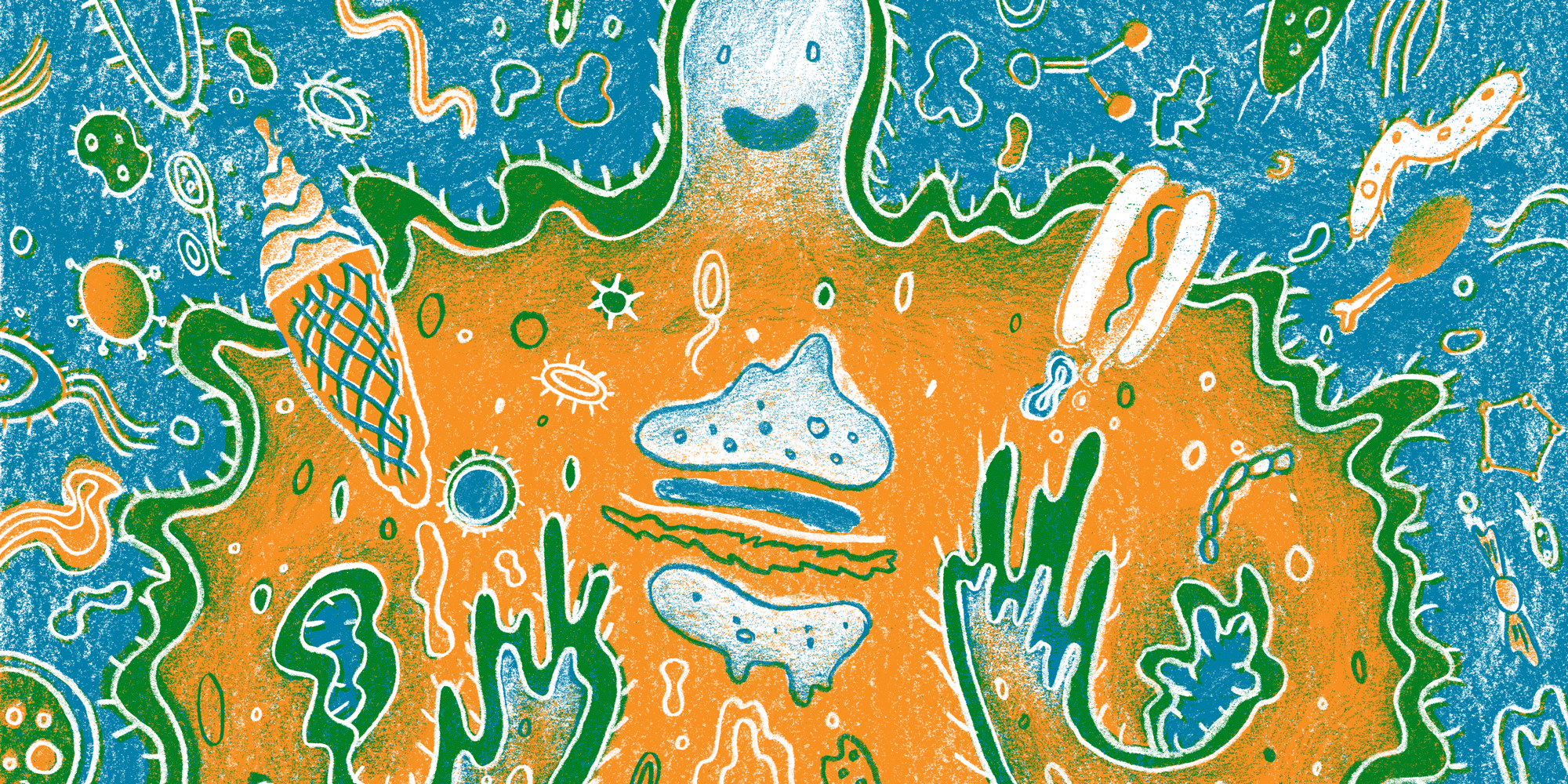Peer-Reviewed Manuscripts
Home-site advantage for host species–specific gut microbiota.
Daniel D. Sprockett Jeffrey D. Price, Anthony F. Juritsch, Robert J. Schmaltz, Madalena Vaz Ferreira Real, Samantha Goldman, Michael Sheehan, Amanda Ramer-Tait, and Andrew H. Moeller (2023)
Sci. Adv.
9 (19).
Widespread extinctions of co-diversified gut bacterial lineages from humans.
Jon G. Sanders, Daniel D. Sprockett Yingying Li, Deus Mjungu, Elizabeth V. Lonsdorf, Jean-Bosco N. Ndjango, Alexander V. Georgiev, John A. Hart, Crickette M. Sanz, David B. Morgan, Martine Peeters, Beatrice H. Hahn, and Andrew H. Moeller (2023)
Nat. Microbiol.
8, 1039-1050.
Influential factors of saliva microbiota composition.
Philippa M. Wells, Daniel D. Sprockett Ruth C. E. Bowyer, Yuko Kurushima, David A. Relman, Frances M.K. Williams, and Claire J. Steves (2022)
Sci/ Rep.
12:18894.
Host Genotype Links to Salivary and Gut Microbiota by Periodontal Status.
Yuko Kurushima, Phillipa Wells, Ruth Bowyer, Noha Zoheir, Stephan Doran, Jonathan Richardson, Daniel D. Sprockett David Relman, Claire Steves, and Luigi Nibali (2022)
J. Dental Res.
1-11.
Microbiomes: Infant Chimps Crawling with Bacteria.
Daniel D. Sprockett and Andrew H. Moeller (2021)
Curr. Biol.
31(3):PR124-R126.
Microbiota Assembly, Structure, and Dynamics Among Tsimane Horticulturalists of the Bolivian Amazon.
Daniel D. Sprockett, Melanie Martin, Elizabeth K. Costello, Adam Burns, Susan P. Holmes, Michael Gurven, David A. Relman (2020)
Nat. Commun.
11, 3772.
Treatment-Specific Composition of Gut Microbiota Is Associated with Disease Remission in a Pediatric Crohn's Disease Cohort.
Daniel Sprockett
, Natalie Fischer, Rotem Sigall Boneh, Dan Turner, Jarek Kierkus, Malgorzata Sladek, Johanna Escher, Eytan Wine, Baruch Yerushalmi, Jorge Amil Dias, Ron Shaoul, Michal Kori, Scott Snapper, Susan Holmes, Athos Bousvaros, Arie Levine, David A. Relman (2019)
Inflamm. Bowel Dis.
25(12): 1927–1938.
Role of priority effects in the early-life assembly of the gut microbiota.
Daniel D. Sprockett
, Tadashi Fukami, and David Relman (2018)
Nat. Rev. Gastroenterol. Hepatol.
* Most Viewed Article of 2018!
Characterization of the facial microbiome in twins discordant for rosacea.
Asifa K. Zaidi, Katrina Spaunhurst,
Daniel Sprockett
, Yolandas Thomason, Margaret W. Mann, Pingfu Fu, Christine Ammons, Meg Gerstenblith, Marie S. Tuttle, and Daniel L. Popkin (2018)
Exp. Dermatol.
27(3): 295-298.
Comparison of pectin-degrading fungal communities in temperate forests using glycosyl hydrolase family 28 pectinase primers targeting Ascomycete fungi.
Matthew D. Gacura,
Daniel D. Sprockett
, Bess Heidenreich, and Christopher B.Blackwood (2016)
J. Microbiol. Methods.
123:108-113.
The effect of microbial colonization on the host proteome varies by gastrointestinal location.
Joshua S. Lichtman, Emily Alsentzer, Mia Jaffe,
Daniel Sprockett
, Evan Masutani, Elvis Ikwa, Gabriela K. Fragiadakis, David Clifford, Bevan Emma Huang, Justin L. Sonnenburg, Kerwyn Casey Huang, and Joshua E. Elias (2015)
ISME J.
10:1170-1181.
Use of 16S rRNA sequencing and quantitative PCR to correlate venous leg ulcer bacterial bioburden dynamics with wound expansion, antibiotic therapy, and healing.
Daniel Sprockett
, Christine Ammons, and Marie Tuttle (2015)
Wound Repair Regen.
23(5): 765-771.
Evolutionary Analysis of Glycosyl Hydrolase Family 28 (GH28) Suggests Lineage-Specific Expansions in Necrotrophic Fungal Pathogens.
Daniel D. Sprockett
, Helen Piontkivska, and Christopher B. Blackwood (2011)
Gene.
479(1-2): 29-36.
Circadian Input Kinases and their Homologs in Cyanobacteria: Evolutionary Constraints Versus Architectural Diversification.
Ivan Baca,
Daniel Sprockett
, and Volodymyr Dvornyk (2010)
J. Mol. Evol.
70(5): 453-465.
Manuscripts Currently Under Peer-Review
Convergent remodeling of the gut microbiome is associated with host energetic condition over long-distance migration.
Brian K. Trevelline, Daniel D. Sprockett William V. DeLuca, Catherine R. Andreadis, Andrew H. Moeller, and Christopher Tonra (2023)
Available on
bioRxiv
Comparing spatial and social structure of C57BL/6J and wild house mice under field conditions.
Caleb C. Vogt, Matthew N. Zipple, Daniel D. Sprockett Caitlin H. Miller, Summer H. Hardy, Matthew Arthur, Adam M. Greenstein, Melanie Colvin, Andrew H. Moeller, and Michael J. Sheehan (2023)
Available on
bioRxiv
Assessing co-diversification in host-associated microbiomes.
Andrew H. Moeller, Jon G. Sanders, Daniel D. Sprockett, and Abigail Landers (2023)
Strategies for understanding dynamic, personalized profiles of host-derived proteins and microbes from human stool.
Casavant, Ellen, Les Dethlefsen, Kris Sankaran, Daniel D. Sprockett Susan Holmes, David Relman, and Joshua Elias (2023)
Available on
bioRxiv
Scientific Writing for the General Public
From time to time, I've also written about science for a general audience. Check out some of my favorite articles below.
Gut Check!
I wrote a weekly science column for The Festival of Dangerious Ideas, a few of which are now hosted on medium.com (Illustrations by Daniel Gray).
Moral enhancements and your micriobiome
 Your stomach bacteria is changing the way you think.
Why the saying “thinking with your gut” is more accurate than you probably realize.
Your stomach bacteria is changing the way you think.
Why the saying “thinking with your gut” is more accurate than you probably realize.
The Microbiome Of Built Environments
 Microbial life is vastly different indoors than out.
Is it time we started designing spaces for microbiology?
Microbial life is vastly different indoors than out.
Is it time we started designing spaces for microbiology?
Do Probiotics Work?
 The word “probiotic” is as general as the word “drug”, so it kind of depends…
The word “probiotic” is as general as the word “drug”, so it kind of depends…
Do these (microbial) genes make me look fat?
 What germ-free mice can teach us about gut bacteria and weight.
What germ-free mice can teach us about gut bacteria and weight.
The Daily Kent Stater
I've also written a weekly science column for The Kent State University campus news paper, The Daily Kent Stater. Here are some of my favorite columns, but you can find them all by clicking the link above.
Overcoming the threat of scientific illiteracy
 "Americans don’t know much about science, and that is a problem."
"Americans don’t know much about science, and that is a problem."
Bad science pervades the abortion debate
 "Dubbed the “Heartbeat Bill,” H.B. No. 125 would ban abortions as early as 18 days after conception, meaning that a woman’s legal choice to pursue an abortion would effectively be restricted until before the vast majority of women even realize they are pregnant."
"Dubbed the “Heartbeat Bill,” H.B. No. 125 would ban abortions as early as 18 days after conception, meaning that a woman’s legal choice to pursue an abortion would effectively be restricted until before the vast majority of women even realize they are pregnant."
Genetically modified crops have a place in sustainable agriculture
 "Truth be told, humans have been altering the genetic makeup of food for thousands of years. Our modern molecular tools are quite a bit more advanced than those of our ancestors, but the end result is the same."
"Truth be told, humans have been altering the genetic makeup of food for thousands of years. Our modern molecular tools are quite a bit more advanced than those of our ancestors, but the end result is the same."
 Your stomach bacteria is changing the way you think.
Why the saying “thinking with your gut” is more accurate than you probably realize.
Your stomach bacteria is changing the way you think.
Why the saying “thinking with your gut” is more accurate than you probably realize.
 Microbial life is vastly different indoors than out.
Is it time we started designing spaces for microbiology?
Microbial life is vastly different indoors than out.
Is it time we started designing spaces for microbiology?
 The word “probiotic” is as general as the word “drug”, so it kind of depends…
The word “probiotic” is as general as the word “drug”, so it kind of depends…
 What germ-free mice can teach us about gut bacteria and weight.
What germ-free mice can teach us about gut bacteria and weight.
 "Americans don’t know much about science, and that is a problem."
"Americans don’t know much about science, and that is a problem."
 "Dubbed the “Heartbeat Bill,” H.B. No. 125 would ban abortions as early as 18 days after conception, meaning that a woman’s legal choice to pursue an abortion would effectively be restricted until before the vast majority of women even realize they are pregnant."
"Dubbed the “Heartbeat Bill,” H.B. No. 125 would ban abortions as early as 18 days after conception, meaning that a woman’s legal choice to pursue an abortion would effectively be restricted until before the vast majority of women even realize they are pregnant."
 "Truth be told, humans have been altering the genetic makeup of food for thousands of years. Our modern molecular tools are quite a bit more advanced than those of our ancestors, but the end result is the same."
"Truth be told, humans have been altering the genetic makeup of food for thousands of years. Our modern molecular tools are quite a bit more advanced than those of our ancestors, but the end result is the same."